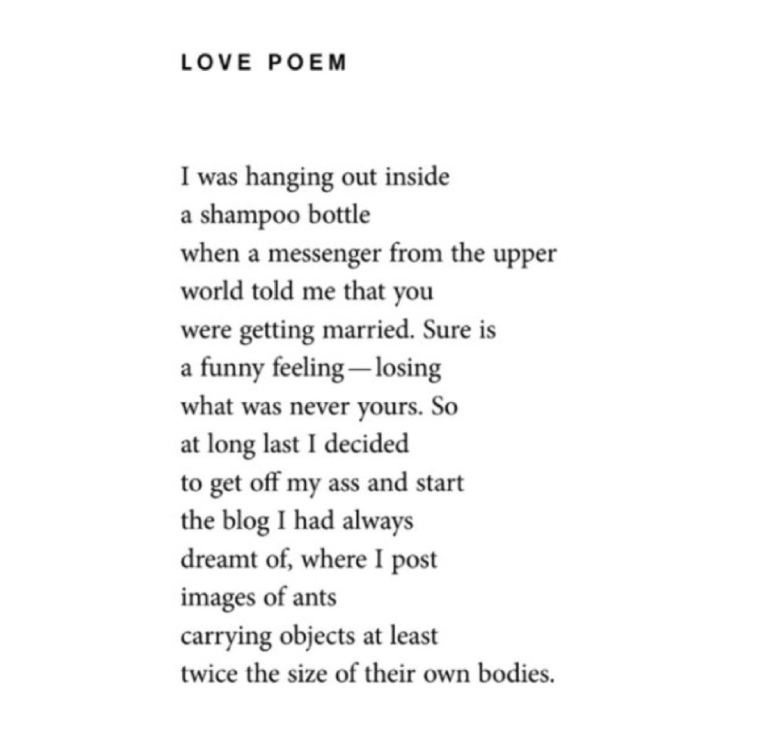/
Artistodemus did not hear the beginning of the discourse, and he was only half awake, but the chief thing which he remembered was …
— Plato, The Symposium
How might we fashion
the pace of chance?
– Sam Kerbel, “Broken Record”
“Broken Record” is from Sam Kerbel’s chapbook, Can’t Beat the Price, a series of poems that riddle, poems that inhabit the riddling, poems engrossed in the unconscious communication between instances and objects. Words are played into their sonic shadows, or their near-homophones, as with “Romance,” which finishes:
Yes royalty is our golden ample
But we’re never quite finished with things
Are we?
The plural pronoun of the last line asks both if “we” are and what “we” is under conditions too thin and skimpy to imagine the events of tomorrow. The conditions, as they stand, are not enough. And yet there is a confirmation — “Yes” – followed by that play on sound and idiom which gives us the “golden ample” rather than the golden apple. The ample is not an apple.
/ /
Come, be my camera.
Let’s photograph the ant heap
— Claribel Alegría, “Documentary” (t. by Alegría and Darwin J. Flakoll)
And it is an overstepping that he obeys.
— Rainer Maria Rilke, “Sonnets to Orpheus I, 5” (t. by Mitchell)
Emanating from my speakers this week: a return to the unforgettable collaboration between David Byrne and Brian Eno that changed my life, namely, My Life in The Bush of Ghosts.
/ / /
A for alcoholism,
B for battalions,
C for corruption,
D for dictatorship,
E for exploitation,
F for the feudal power
of fourteen families
and etcetera, etcetera, etcetera.
My etcetera country,
my wounded country,
my child,
my tears,
my obsession.
— Claribel Alegría, “Documentary” (t. by Alegría and Darwin J. Flakoll)
Per the intertextual intimacy of literary friendships that emerges in tributes and dedications . . . in an introduction to Gerald Stern’s poetry book, I., Ross Gay recollects his days as Stern’s student, where learning involved more than studying assigned texts but also moving through the world with his mentor. Ross and Gerald went to the East River one day because Gerald “needed to properly describe a scene he was imagining in the poem sections XX/IXXVish, to describe some shores and mucks and signage and such—it's called lyric research: get up there about (often up thereabouts is in your head, or your soul and start sniffing around. Also known as adamant digression.)
Lyric research and adamant digression: emphatic pleasures in the writing life. Along the course of his discursive introduction, Ross Gay also shares his experience of a poetry reading with Stern— a few big names out in a field:
Maybe there was a creaky foldout stage. By the time the reading started-about ten minutes after the time on the flyer, which is a little early for my tastes, but not terrible; to be clear: poetry readings should not start on time; it is violence upon poetry, upon the lyric—there were about ten people there. At most fifteen.
At a different point, Ross recalls a wild poetry party which culminated in a metro ride:
Anyhow, as the three of us were riding home on the NJ Transit, somehow the singer Bjork came up— it's possible we got there first by talking about Lars von Trier's movies, the most recent of which, Dancer in the Dark, Björk had starred in and made the soundtrack for-and because it happened that I had the CD in my Sony CDman in my backpack, and Jerry was curious, I gave him the CDman, Jerry put on the headphones (small ordeal this, I pressed play for him, he closed his eyes, and listened so hard that Brooke— herself a young theater artist at the time who earlier that day had been rehearsing in a church basement in Greenpoint); it was with Brooke that I first went to Greenpoint actually noticed it. Look how he's listening, she elbowed me and whispered. Then we tried to watch him listen.
Which you can't exactly do, though a poem, reading someone's poem is a pretty good technology for trying. Which is maybe a meandery way of wondering what “I.” is listening to.
What’s “I,” listening to? The most obvious answer, though I don't think the most 'important" one (those “most important” and “best of” lists, well, you know... stupid), is what Jerry himself alerts us to in the introduction— this is a kind of midrashic poem, or a poem that is dallying with a primary text, which in this case (the text primarily dealt with) is called The Bible. (That is as lit-critty as this is going to get, don't worry.) And the character I. is a version (this, too, from the intro— also, a lovely generosity, don't you think, the introduction to a poem by the poet?) of Isaiah, who, full disclosure, I am less familiar with than some of the other “I.” characters, particularly Ishmael . . .
Idioms rely on familiarity with prior reference and context: a moment in which the image ‘made sense’ becomes an expression that makes sense of the moment. To half-encircle myself, I return to what Plato said that Aristodemus “remembered”:
/ / / /
Elsewhere, on Mount Olympus, the gods argue amongst themselves.
When representing her dark aspect, Hecate wears a necklace made of testicles; the hair on her head composed of writhing snakes which petrify those who look at them, much like those in the myth of Medusa.




